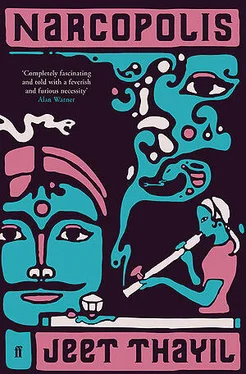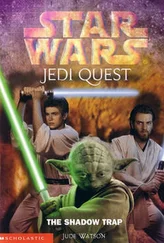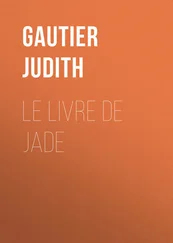*
The brothel-keeper, Dimple’s tai, paid Rashid a formal visit. She was full of complaints. She said Dimple was spending too much time at the khana, she’d become a full-time professional drug addict, she was no longer earning her keep. The other girls brought in more money, said the tai, addressing only Rashid. Not once during the visit did the tai and Dimple speak or look at each other. Dimple made Rashid’s pipe the way she always did, calm and silent, her hands steady, while the tai drank her tea, made her speech and left. That afternoon, Rashid took Dimple to a room on a half landing between the khana and the first floor where his family lived. There was a wooden cot, a chair and washstand, a window with a soiled curtain. She knew what he wanted. She took off her salvaar and folded it on the back of the chair. She lay on the cot and pulled her kameez up to her shoulders to show him her breasts. Her legs were open, the ridged skin stretched like a ghost vagina.
He said, You’re like a woman. She said: I am a woman, see for yourself. She didn’t want him on top of her because he was too heavy for her back. She told him to sit on the cot while she faced him, her arms around his neck and her ankles locked on his hips. It took a long time, the drugs working in opposition to his blood; but she didn’t stop until he was finished, shuddering with effort, his hands angled on the bed, his eyes looking into hers.
He said, ‘What about you, what do you feel?’
‘Fine.’
‘No. What I want to know, do you feel pleasure or not?’
‘Not like you do and not the way a woman does.’
‘You don’t feel anything.’
‘Oh, bilkul, I do. I feel pleasure but not, what’s the word, relief.’
He studied her face as she arranged her kameez and tidied her hair. He said: I want you to move here, into this room. I’ll send someone with you to collect your things.
*
Her life at the brothel was coming to an end, she knew. She was treated better than some of the others but she worked three or four giraks a day. She was in her late twenties and already she felt middle-aged. She’d lived and worked at Number 007 for more than fifteen years. The work was fast. The giraks didn’t take off their clothes. They unzipped, they finished in minutes and they were gone. Their desire for her, for sex, was theoretical. It had no reality. It was the idea of a eunuch in a filthy brothel in Shuklaji Street, this was what they paid for. Dimple thought: They like the dirtiness of it. Nothing else gets their dicks so hard. They don’t think of themselves as homosexuals. They have wives and children and they’re always making jokes about gandus and chakkas. It’s all about money: they think eunuchs give better value than women. Eunuchs know what men want in a way other randis don’t, they know men like it dirty.
Lakshmi’s way of putting it: what dogs we are when we are men. Lakshmi worked the street, getting shop owners and pedestrians to part with money, doing this with nothing more than a clap of her man’s hands. She did it now, a gunshot clap designed to cut through heavy Bombay traffic. A customer in the main room turned around in alarm. He was trying to persuade the tai to give him a discount rate for two prostitutes. Lakshmi said, Men are dogs. We know and they know. Only women don’t know. Isn’t that right, darling? she told the customer. Aren’t you a dog sniffing around my ass for a free fuck?
*
After the customer left in search of a brothel with better rates, Dimple stood on the balcony of 007 and looked down into the street at the cook fires and crowds of pedestrians. Then she put on her sandals and went out. The paanwallah was listening to AIR and he smiled at her when she stepped into his cubicle. She ordered a Calcutta meetha and watched as he assembled it. He was listening to cricket commentary, a match between India and the West Indies. They talked for a while about Indian versus West Indian batsmen. The Indians were skilled but they were no match for the blacks, said the paanwallah. Dimple asked him what he thought about Gavaskar. The paanwallah said Gavaskar was okay but he lacked something. No killer instinct, and that was the problem with Indians. Dimple asked if killer instinct was all you needed to play a good game and the paanwallah laughed and said he knew what Dimple was leading up to but he’d been in the game for a while himself and he knew a couple of things. Dimple said she was only passing the time of day and then she asked if he put enough supari in the Calcutta. The paanwallah said there was enough supari to make a horse kick and he told her to come back if she wasn’t satisfied and he would give her a free one. He said Gavaskar was a good man and a technically sound player, but he was not accustomed to the taste of blood. It didn’t excite him. Indians were too mild, said the paanwallah, and it was Gandhi’s fault. The old man had taken a race of bloodthirsty warriors, taught them non-violence and made them into saints and grass eaters. Dimple laughed. She told the paanwallah to take a look around. Indians were as violent and bloodthirsty as ever, and they would always be looking for an excuse to hack or burn or gouge each other. The paanwallah laughed too. Back in her room, she chewed the paan and watched herself in the hand mirror hanging on a nail above the sink. She watched the shape her mouth made and she looked at her eyes and skin and hair and made a critical assessment: not bad. As she got older it took more work to look good. The more difficult it became, the more she smoked. The more she smoked, the more difficult it became. She thought: If I lose my looks I don’t want to live. I don’t want to be like the tai whose only joy in life is money. Dimple was the tai’s chela, the tai-in-waiting. When she was old and no longer able to work, she’d take care of the business and oversee the other randis. She’d handle money all day long. She would know no other life. It was an inevitability that needed correction and she was correcting her life. So she asked Rashid to wait while she moved her things in small consignments, relocating herself a piece at a time. There was no question of taking her earnings with her. The tai would say that Dimple owed her for food and board, and besides, it was probably a fair exchange: she was trading money (her earnings) for pleasure (her freedom). Variations of this transaction occurred on the street a thousand times a day.
*
She told only one girak that she was leaving, a pocket-maar who always smoked at her station. He’d smoke and talk, softly, so the other customers wouldn’t hear him. Rashid made jokes, calling him her new boyfriend. Then the pocket-maar came to see her at the brothel. He sold cocaine and whisky for one of the Lalas. He was tall and skinny, his thin legs and bony knees out of proportion to his big belly and chest, and he wore his hair long, down to his collar like a hippie. He gave her different amounts each time, two or three or four hundred rupees in small bills, but it was double the amount he was expected to pay and she was always happy to see him. He ordered strong beer, Cannon or Khajuraho, and he sprawled on the bed, drinking from the bottle. He gossiped about the private lives of Raj Kapoor and Nargis, Shashi Kapoor and Shabana Azmi, and his favourite topic, Amitabh Bachchan and Rekha. He kissed Dimple on the lips. She’d wipe her mouth and he’d kiss her again. He took his time, locking the door and staying so long the tai pounded on the partition, shouting, Salim. Finished. Time finished. Dimple, open up, did he die inside you or what?
One night he asked if she would look after a bag for him, a nylon Air India shoulder bag that was zipped but unlocked. He handed it over and disappeared. Inside she found bundles of hundred-rupee notes, and, rolled in a T-shirt, two pistols, large six-guns like the firearms brandished by Clint Eastwood in English movies. She put the bag into a steel Godrej almirah and carried the key on a chain she attached to the waistband of her salvaar. Salim was gone for three weeks. He came back shrunken, with new bruises on the soles of his feet and on his back. He said: Chit-chat with the police, friendly gup-shup, yaar, with the brown crows. She opened a bottle of White Flower Oil from a box that Mr Lee had given her and rubbed it into the discolorations on his skin. The oil’s cold burn helped him heal. After this Salim brought her little gifts: plastic hair clips, a key chain, a tiny handbag, a black leather diary with the phone codes of all the world’s cities and special pockets for business cards and photos. Sometimes he expected not sex but conversation. He wanted her to tell him what was in the book she was reading, and she would try to encapsulate it for him, encapsulate in a few sentences a three-hundred-page novel by a Latin American or European author. He would ask about her health, about her day, and it would irritate her. What was there to say? Her day was always the same. She worked at 007 and she worked at Rashid’s and when she was not working she taught herself to read, there was nothing more to it. His questions were useless but comforting. She wondered if this was what it meant to be married, to be a wife. You were bored and irritated and comforted, all at the same time.
Читать дальше












